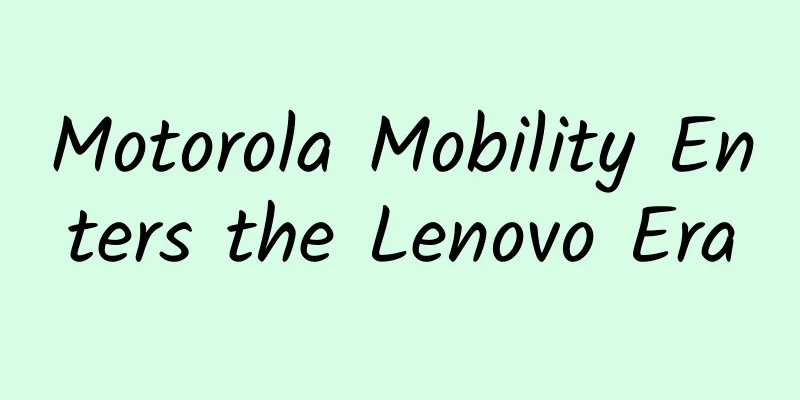Motorola Mobility Enters the Lenovo Era

|
After nine months of waiting, Lenovo Group CEO Yang Yuanqing finally got the result he wanted: Lenovo Group's acquisition of Motorola Mobility was officially completed. On the evening of October 30, Lenovo Group convened the media to officially announce the news. Yang Yuanqing, who was far away in Chicago, USA, was all smiles as he accepted the exclusive interview with the media via remote video. It can be seen that Yang Yuanqing was in a very happy mood because from this moment on, he could finally implement his transformation plan for Motorola Mobility and realize Lenovo's mobile phone overseas expansion plan in one fell swoop. On January 29 this year, Lenovo Group announced that it had purchased Motorola Mobility from Google for $2.9 billion. Once the deal was announced, it attracted great attention from all walks of life around the world. After nine months of approval by global government agencies, the deal was finally officially concluded. For Google, by selling Motorola Mobility, it finally got rid of an asset burden that was eating up its profits; for Lenovo Group, by acquiring Motorola Mobility, it finally got a ticket to expand aggressively in the global mobile phone market. The slightly sadder thing is that Motorola, after being split up and sold twice, can only wait for Lenovo Group to revive its strong brand in the consumer market. Google gets rid of a heavy burden: Sold it!Moto's quarterly revenue and losses from 2012 to 2014In August 2011, Google announced that it would acquire Motorola Mobility for US$40.00 per share in cash, with a total amount of approximately US$12.5 billion. After more than half a year of review, Google officially completed the acquisition in May 2012. Since Apple's iPhone had already achieved success when Google announced its acquisition of Motorola Mobility, there was speculation that Google might follow Apple's example and go further on the path of integrating software, hardware and applications. This speculation also caused tensions between many Android phone manufacturers and Google, because they were worried that since Motorola Mobility was a subsidiary of Google, it would be able to get more support from Google, for example, being the first to get the latest version of the Android operating system. In fact, Google launched several mobile phone products after acquiring Motorola Mobility, but the market sales were not outstanding. The important reason why Google was determined to sell this part of the business was that the hardware business with low gross profit margin began to drag down Google's overall profit performance from the moment the acquisition was completed. Google first merged Motorola Mobility's business in its financial statements for the second quarter of 2012, and Motorola Mobility lost $233 million in that quarter. Since then, as Google has restructured Motorola Mobility's business and laid off a large number of employees, Motorola Mobility's losses have further intensified. As of the completion of this acquisition, Motorola Mobility's total losses in the past 10 quarters have reached $2.8 billion. Due to the small shipment volume and high operating costs, Motorola Mobility had little hope of turning losses into profits under Google's operation. Finally, at the end of 2013, Google Chairman Schmidt sent an email to Lenovo Group CEO Yang Yuanqing, asking whether Lenovo Group was still interested in acquiring Motorola Mobility's business. In fact, after Google announced the acquisition of Motorola Mobility in 2011, Yang Yuanqing invited Schmidt to his home and expressed his desire to acquire Motorola Mobility's mobile phone business. However, at that time, Google intended to operate it itself and had no intention of selling it. In May 2012, Google officially took over Motorola Mobility for $12.5 billion. Two and a half years later, Google officially sold Motorola Mobility for $2.9 billion. On the surface, Google seemed to have "lost a lot", but since Motorola Mobility still had about $3 billion in cash at the time of the acquisition, and Google earned $2.35 billion from the sale of Motorola's set-top box business, Google actually acquired 15,000 patents at a relatively reasonable price, and owning these patents will allow Google to better develop the Android ecosystem. Although Motorola Mobility is a "hot potato" for Google from the perspective of performance contribution, but in the hands of Yang Yuanqing, this "hot potato" has become an extremely important asset and is expected to make a profit soon. Lenovo wants to break through overseas: buy it!Yang Yuanqing was very happy after the acquisition and took a photo of the pizza with the Moto logo on it with his mobile phone.As Motorola suffered heavy losses and had no hope of turning losses into profits, Lenovo's stock price fell sharply after Lenovo Group announced the acquisition of Motorola Mobility, because investors were worried that Motorola's mobile business would drag down Lenovo's profitability. "Don't be intimidated by a loss of $1 billion a year," Yang Yuanqing confidently told the media at the Mobile World Congress in Spain in February this year, "We will improve this situation from day one." Yang Yuanqing reiterated this point yesterday, saying that Lenovo Group is confident that it can help Motorola Mobility turn losses into profits within 4 to 6 quarters after completing the acquisition. Prior to this, Barclays Bank's Hong Kong-based analyst Yang Yingchao had predicted that Lenovo Group could "easily" cut 70% of the operating expenses of Motorola's mobile phone business. According to Google's financial report, half of Motorola Mobility's revenue comes from the two mature markets of the United States and the United Kingdom, and these mature markets are exactly the overseas markets that Lenovo Mobile wants to break into. Lenovo's original market channels for smartphones are mainly in China, Southeast Asia, Russia and other European countries. By borrowing the Motorola brand, Lenovo will be able to successfully enter the North American and South American markets. At the same time, through the acquisition transaction, Lenovo Group also obtained Google's patent authorization and operator relationship, which laid a solid foundation for Lenovo's mobile phone business to expand into the global market. According to data from market research firm IDC, the acquisition of Motorola Mobility will enable Lenovo to consolidate its position as the world's third largest mobile phone manufacturer and is expected to launch a strong challenge to the top two companies, Samsung and Apple. Most importantly, with the help of Motorola's expansion in overseas markets, Lenovo Group will be able to stay away from the fiercely competitive domestic mobile phone market and continue to build the mobile phone business into Lenovo's new profit engine. Yang Yuanqing said, "Motorola Mobility used to be a marginal business of Google, but now it is a strategic business of Lenovo and is at the strategic center." Liu Jun, Lenovo's executive vice president and president of the mobile business group, revealed that according to the plan, Lenovo Group will use the Lenovo and Moto dual-brand strategy in the future and maintain independence in R&D and design, but the two brands will share back-end supply chain and procurement services. At the same time, the Moto brand will soon return to the Chinese market. At the highest level, Liu Jun will serve as chairman of Motorola Mobility's management committee, while Motorola senior executive Rick Osterloh will continue to serve as Motorola's president and chief operating officer. Motorola's rapid decline: Why?At the announcement of the acquisition, Lenovo called it a "$2.91 billion pizza dinner"Before the 1990s, Motorola had always been a leader in the communications field. In 1984, it was Motorola that brought the so-called "big brother" mobile phone to the consumer market and has been a leading company in the mobile phone market ever since. However, in the tide of transition from analog communications to digital communications, Motorola lost the opportunity because it clung to its huge advantages in the analog era and was overtaken by Samsung and Nokia. In the development history of Motorola, the company also developed a mobile phone operating system, but because it bet on the wrong technology platform, it ultimately failed to develop. Wu Jun, the author of "The Wave at the Top", once called Motorola a declining aristocratic enterprise in his book. One of the important reasons for its decline was that the company had not had a strong CEO candidate since the third generation of management of the Calvin family. On January 4, 2011, Motorola was officially split into two divisions, namely Motorola Mobility and Motorola Solutions. The former division focuses on smartphones and set-top box businesses, while the latter focuses on public safety radios and handheld scanner businesses. After Sanja Jha from Qualcomm took over as CEO of Motorola Mobility, he implemented a drastic restructuring plan, which helped Motorola Mobility achieve a short-term profit and eventually sold it to Google. Today, Google sold Motorola Mobility to Lenovo Group. Yang Yuanqing said that after taking over, Lenovo will carry forward the Motorola brand. Motorola was founded by Paul Galvin. When he founded the company, he would never have imagined that this brand with more than 80 years of history would eventually be managed by a Chinese company and would define a new brand meaning for it in the consumer market. "Motorola was, is and will continue to be a high-quality and technologically advanced brand," said Yang Yuanqing. Lenovo will only make it better and better and make it flourish, and will never damage its glory. I can guarantee that you will see more and more innovative and creative Motorola products. As a winner of Toutiao's Qingyun Plan and Baijiahao's Bai+ Plan, the 2019 Baidu Digital Author of the Year, the Baijiahao's Most Popular Author in the Technology Field, the 2019 Sogou Technology and Culture Author, and the 2021 Baijiahao Quarterly Influential Creator, he has won many awards, including the 2013 Sohu Best Industry Media Person, the 2015 China New Media Entrepreneurship Competition Beijing Third Place, the 2015 Guangmang Experience Award, the 2015 China New Media Entrepreneurship Competition Finals Third Place, and the 2018 Baidu Dynamic Annual Powerful Celebrity. |
<<: Nokia's comeback is not impossible
>>: What does it mean for smart home hardware manufacturers to connect with Tencent?
Recommend
It turns out that these fruits and nuts we often eat grow like this!
In our daily lives, we eat a lot of fruits and nu...
Are mushrooms plants? No, they are macrofungi!
Speaking of fungi, some people may say that they ...
How much does it cost to make a geotechnical building materials mini program in Karamay?
More and more businesses are paying attention to ...
Quantitative Lecture Hall Quantitative Potential Classroom Su Tianfa "Time-sharing Quantitative Wave Strategy"
Quantitative Lecture Hall Quantitative Potential ...
Guangdong, Dam Machine! The "Best Dam Machine in Guangdong"
Guangdong Province has many rivers, mainly the Pe...
Frequency band division of wireless technology for the Internet of Things
Wireless communication technologies all need cert...
Gaining 3 pounds every holiday season? Learn the "10 fists" principle and lose weight without dieting!
After a baptism of delicious food during the Spri...
A hotbed for information plagiarists, iOS reveals the Masque Attack vulnerability
Recently, the cybersecurity company FireEye annou...
It is said that the money counting machine has turned into a black hole: 40 banknotes were counted 9 times and only 10 were left
40 100-yuan bills were put into a money counting ...
Creative analysis of educational and training advertising materials!
According to QuestMobile data, the online educati...
"Food Safety Guide" Series | Can children eat ice cream? Keep these points in mind!
In the hot summer, people still want to eat somet...
Online shopping also needs to be "expressed eight hundred miles away", travel back in time! Talk about the express delivery in ancient times~
In today's Internet age Everyone enjoys the c...
The 10 most disappointing founders of 2015
[[161252]] Editor's note: In this article, St...
What are those white spots at the roots of your hair? Will you become bald if you don't have them?
One minute, Doctor. Postures keep rising - End of...
Rat head found in the cafeteria again? This time it's not...
Recently, I saw the news online that a "rat ...







![Kaikeba Smart Logistics—Order Delivery Planning [2,4]](/upload/images/67cc12d431291.webp)

